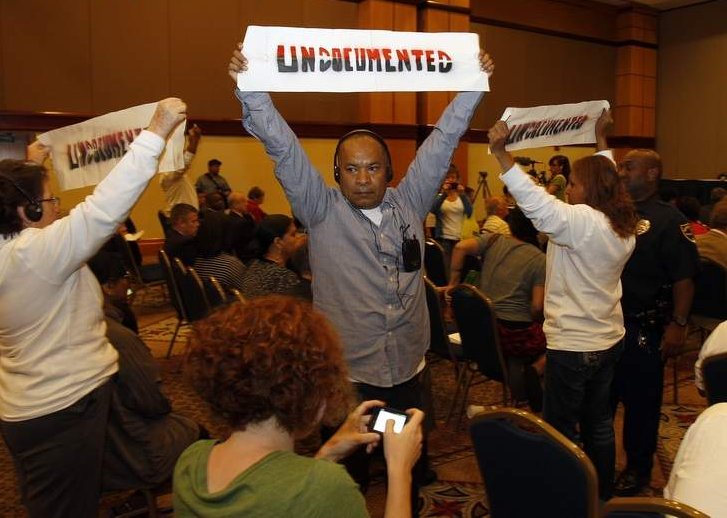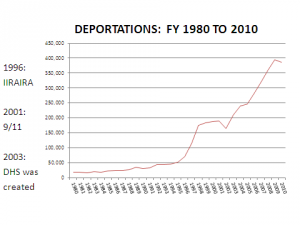U.S. Commission on Civil Rights holds hearings on Arizona and Alabama apartheid bills
This was on the front page of to-day’s OA News (front page, continued on p. 8A). The online copy is a bit longer than what appeared in print (there are a couple paragraphs at the end that the OA News cut from the printed edition). The U.S. Civil Rights Commission recently held a meeting in Birmingham to discuss SB 1070 and HB 56, the international apartheid police-state bills in Arizona and Alabama. Demonstrators showed up to inject some reality into the proceedings.

From the Associated Press.
Quarrelsome commission
Civil rights panel has first meeting to discuss laws
BIRMINGHAM — A quarrelsome U.S. Commission on Civil Rights held its first hearing on state laws that target illegal immigration, with Republican backers arguing Friday that the measures are vital to protecting American jobs and fighting crime.
Kansas Secretary of State Kris Kobach, who helped write similar immigration laws in Arizona and Alabama, said unemployment in Alabama has dropped three times faster than the national average since parts of the state's law took effect last fall — a change he credited at least in part to the act.
Attempting to head off claims that the laws lead to racial profiling by police, Kobach said the immigration enforcement specifically bars officers from making stops or arrests based on appearance.
As he spoke, four Hispanic women and a girl stood in the audience with their backs toward Kobach. Demonstrators, some speaking Spanish, stood up holding signs that said
Undocumentedand shouted at Kobach.
These laws are based on hate,said one man.The meeting room quieted after officers escorted protesters away, but the commissioners still bickered among themselves. . . . Congressional appointee Todd Gaziano, legal director of the conservative Heritage Foundation, accused the demonstrators of
hateful speech. . . . Gaziano and chairman Martin R. Castro, appointed by President Barack Obama, exchanged sharp words throughout the opening session. Members even disagreed over who should be allowed to testify, with organizations accusing each other of being hate groups.The commission will issue a report within months on the findings of the hearing, which focused on whether the state laws foster discrimination and run counter to civil rights laws. But the panel doesn't have any enforcement power, and it can't make states alter their laws.
The U.S. Supreme Court struck down three parts of Arizona's law in June, but it upheld a section that requires police to check the status of people who might appear to be in the country illegally. The ruling was closely watched because Alabama, Georgia, South Carolina, Indiana and Utah have approved similar laws.
Courts have blocked all or parts of the laws in each state, and legal challenges are now moving forward since the justices ruled on the Arizona statute . . . .
Law opponent Tammy Besherse, an attorney with South Carolina Appleseed Legal Justice Center, accused law officers of destroying immigrants' legal documents and of playing computer games in which participants kill Mexican immigrants.
GOP state Sen. Scott Beason, a key sponsor of Alabama's law, said opponents of the laws and the media place more value on the rights of illegal immigrants than the plight of legal U.S. citizens who can't find work because of people living in the country unlawfully.
We cannot solve the world's problems, but we can make sure we don't import some problems,Beason said. Responding to a question about a U.S. Chamber of Commerce that cast immigration in a positive light, Beason said the business organization ispretty slantedbecause some of its members employ illegal immigrants.[1]Castro said the Alabama hearing was the commission's first outside Washington, D.C., in years. The panel's first-ever was held in Birmingham in 1958, when state and local laws mandated racial segregation.
— Jay Reeves, Associated Press, Quarrelsome commission: Civil rights panel has first meeting to discuss laws. Opelika-Auburn News, 18 August 2012.
The article goes to some effort to make it out that the fights amongst the panel members were signs of a clear divide
between Republicans and Democrats, conservatives and liberals.
Of course the notion that the Democratic Party appointees maintain any divide,
or have any quarrel,
other than a purely rhetorical one, from the Republicans, is absurd. In 2008, presidential candidate Obama promised comprehensive immigration reform, paths out of the shadows
for undocumented immigrants, and promised that immigration reform would be a top priority in my first year as President
. In 2012, four years later, Liberal Democratic President Barack Obama has accomplished nothing at all towards comprehensive reform or towards paths to citizenship. The claim that it would be a top priority in his first year in office was a lie; he abandoned it as soon as he sat down in the Oval Office, concentrated on pushing stimulus bills and fighting wars and bailing out failed capitalists — and then he radically escalated the militarization of the border, and he presided over the largest mass deportations of peaceful immigrants in the history of the United States. Even his weakest, latest-coming promises have been lies, broken as soon as they were made. But there is a real divide here. It’s not a divide on the panel; it’s the divide between the panel, and the protesters who courageously stood up to challenge them. I am glad to see people calling out Kobach, and challenging this kind of political palavering over the lives and livelihoods of immigrant families. More power to them.
Also.
- GT 2012-08-06: Free Alfonso Perez
- GT 2011-10-24: Letter to the Editor of the Opelika-Auburn News, October 10, 2011
- GT 2011-10-22: Change You Can Believe In (Vol. III, No. 10)
- [1][I-word and xenophobia sic. –RG.]↩
